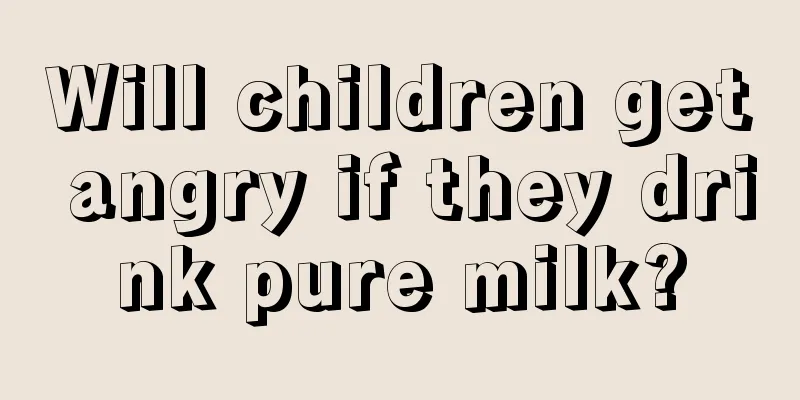What to do if your baby has milk accumulation

|
Some babies have been fed half breast milk and half formula. When they are two months old, they show signs of not liking to eat formula or drink breast milk. The sides of their noses are a little blue, and they spit up milk. At the same time, it is very difficult for them to defecate, and sometimes yellow mucus comes out when they fart. We say that this may be caused by milk accumulation. Generally, milk accumulation in babies is often related to indigestion caused by eating too much. 1. Causes of milk accumulation in babies Baby's milk accumulation may be caused by indigestion of the baby's diet, which is related to the mother's breast milk, personal hygiene during feeding, or eating too much. If your baby has a heavy tongue coating, it is usually caused by getting angry, or it may be caused by indigestion. This situation may be related to the relatively immature development of the child's liver and kidney functions. Newborns' absorption of milk protein will increase compared to the first few days after birth, but their liver and kidney functions are relatively insufficient. Long-term excessive work will cause "fatigue" of the liver and kidneys, which require proper "rest" and "adjustment". As a result, there is a decrease in milk intake. 2. Symptoms of milk accumulation in babies If the baby has milk accumulation, that is, food accumulation, the baby will have bloating, vomiting, loose stools with a sour smell, and a large amount of undigested milk. The baby may also have a fever. If the baby is always averse to milk, it will cause malnutrition and other phenomena. 3. What to do if your baby has milk accumulation 1. Put aside your anxiety and observe your child carefully. If the child just doesn't like to drink milk powder, but drinks water and eats breast milk normally, and the child often has a smile on his face, don't be too anxious at this time. This may be a good opportunity for children to adjust themselves. 2. If the child still eats some breast milk, you can increase the number of breastfeeding times and change the taste of the milk powder for the child, such as changing the brand of milk powder, diluting the milk powder or adding a little rice flour. It is generally not recommended to force children to eat. 3. Make sure the baby can concentrate when feeding. Do not allow other people to play with the baby or attract the baby's attention, etc. Otherwise, the baby cannot concentrate on drinking milk and will definitely not like breast milk. 4. Breastfeed in a place with appropriate lighting, and try to ensure that the surrounding environment is not too noisy. If it is too noisy, the child will not be able to concentrate. Too glaring light will also affect the baby's drinking of milk. 5. It is recommended to take some digestive aids orally, pay attention to eating small meals frequently, give the baby more water, massage the abdomen more often, and adjust the baby's mood for drinking milk. If the baby does not like to drink milk so much, starve him for a while and then drink when he wants to. It is best to drink milk at the prescribed time. |
<<: What are the blood indicators for roseola infantum?
>>: The difference between umbilical cord protection and umbilical cord protection stickers
Recommend
What should I do if my baby still can't crawl after eight months?
When there are babies at home, the daily topic re...
Self-diagnosis of enuresis in children
Enuresis in children mainly refers to the situati...
How to treat a baby who is always crying
Babies who have just turned one month old are alw...
What happens if you hit a child on the face often?
I believe everyone knows the principle of not exp...
Can newborns smell floral water?
In summer, we often use floral water, which has a...
How many naps does a 10-month-old baby take during the day?
Newborns tend to sleep for long periods of time. ...
Reasons why children wet the bed at night
It is quite common for children to wet the bed at...
What are the clinical symptoms of baby’s abdominal bloating?
Mothers often see their babies with bloating. The...
How to treat chronic tonsillitis in children
Chronic tonsillitis in children is a common disea...
Six breakfast foods to keep your child nutritious
Breakfast nutrition is the basis of the day, so i...
Physical treatment methods for reducing fever in children
In our lives, it may often happen that babies hav...
Treatment of baby stool card
Babies' stuck stools often leave our parents ...
Why do newborns wake up easily when sleeping?
There will be many strange behaviors in babies af...
What should I do if my child has pigmentation on his face?
We all know that some adult women are particularl...
At what age should children start brushing their teeth?
The development of children is very important. Du...









